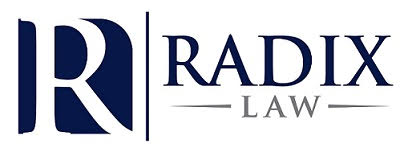At Radix Law, we have significant experience helping both business and individual clients navigate the complexities of Chapter 7, Chapter 11 and Chapter 13 bankruptcy cases. Whether the bankruptcy involves complex corporate matters or a comparatively simple personal bankruptcy, our attorneys are committed to protecting the rights and interests of our clients, who include both debtors and creditors.

Law
Radix Law offers full-service bankruptcy services for individual and business debtors and creditors in Arizona. Contact our office today to schedule a consultation.


Chapter 7
Chapter 7 bankruptcy allows most debtors to eliminate or “discharge” their unsecured debts, like credit card debts, medical debts and personal loans. It is often referred to as a “liquidation” because any non-exempt assets may be sold to repay creditors. However, debtors are entitled to use certain state and federal exemptions, often protecting most, if not all, of their assets. In general, Chapter 7
is intended to be used by low to moderate income debtors who do not have the ability to repay their debts. Sometimes even debtors with a higher income are eligible to file a Chapter 7 case if more than half of their debts are “non- consumer” in nature. Examples of non-consumer debts are debts incurred for a business purpose, and certain tax debts. Eligibility to file a Chapter 7 case is
determined based on numerous factors. And just because a debtor is eligible to file a Chapter 7 case does not mean it is the best option. These considerations should be weighed with the help of an experienced bankruptcy attorney.
Chapter 13
Chapter 13 is available to individuals and sole proprietorships but is not available to corporate entities. The combined secured and unsecured debt limit for Chapter 13 cases was raised to $2,750,000 in June 2022. It is a restructuring bankruptcy generally used by debtors with higher incomes, who can afford to repay some portion of their debts. In most cases, debtors do not have to give up assets they would have to in a Chapter 7. Chapter 13 plans typically are for five years but can be as short as three years. Chapter 13 provides certain opportunities that a Chapter 7 does not. For example, through a Chapter 13 plan, a homeowner may be able to avoid foreclosure and repay mortgage arrearages on a primary residence. Delinquent taxes can be addressed. A debtor can also restructure certain other secured debts. Chapter 13 debtors make a trustee payment each month in an amount calculated to be disposable income, and at the end of the plan, they receive a discharge of the remaining debt, if any. In a Chapter 13, we have many opportunities to utilize the provisions of the Bankruptcy Code to optimize its benefits for eligible debtors. The bankruptcy attorneys at Radix Law have decades of experience in Chapter 13 reorganizations and always ensure that clients are made aware of their options.
Chapter 11
Chapter 11 is similar in nature to a Chapter 13 but is available to individuals, partnerships and corporations. No debt limits exist in a traditional Chapter 11 case. These are reorganization type bankruptcies, and usually the debtor remains “in possession”, acting as the business or individuals’ own trustee. Businesses can continue to operate, and can borrow money and pay employees, among other things, with court approval. A Chapter 11 debtor submits required disclosures and a plan of reorganization, and creditors may vote on the plan. The court must “confirm” or approve the plan if it receives the required votes and satisfies other requirements contained in the Bankruptcy Code. The debtor-in-possession has many duties, like accounting for property, filing monthly operating reports and maintaining a debtor-in-possession bank account, among other things. After a Chapter 11 debtor has performed all obligations under a confirmed plan, a discharge is entered. Often significant debts are discharged, and businesses emerge with reorganized operations. Chapter 11 cases are more complex than other types of bankruptcies and are also significantly more costly. But with the help of an experienced bankruptcy attorney, in the right cases, Chapter 11 can help individuals and businesses through difficult times.
Subchapter V
The Small Business Reorganization Act, commonly referred to as “Subchapter V”, is a streamlined, flexible process for small businesses to reorganize in bankruptcy.
Schedule a Consultation
Fill out the form below and we will reach out to schedule.
"*" indicates required fields
DISCLAIMER: NOTHING CONTAINED ON THIS WEBSITE IS INTENDED AS LEGAL ADVICE. each client’s needs are unique and application of the law to any given set of circumstances should be determined in consultation with an experienced arizona bankruptcy attorney.
ARIZONA BANKRUPTCY DISCLOSURE: radix law’s experienced bankruptcy attorneys represent both individuals and small businesses in all chapters of bankruptcy. we represent both debtors and creditors in bankruptcy cases. bankrupty laws are complex, and we feel privileged to assit our clients through the complicated process. WE ARE A DEBT RELIEF AGENCY.

